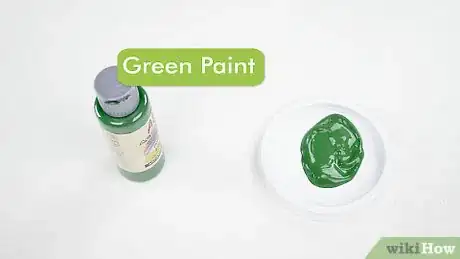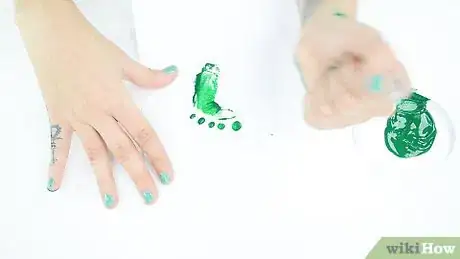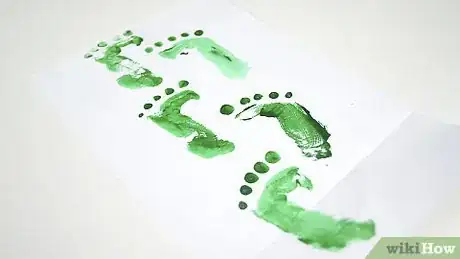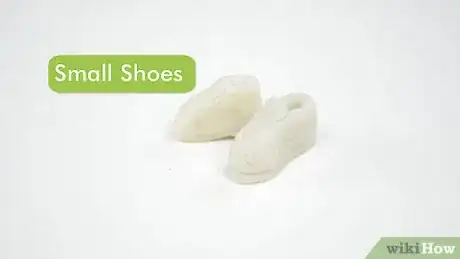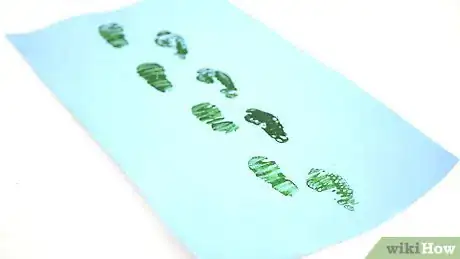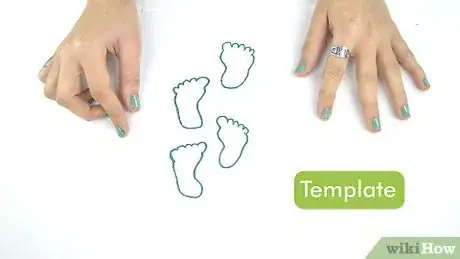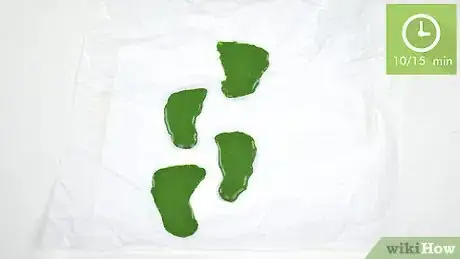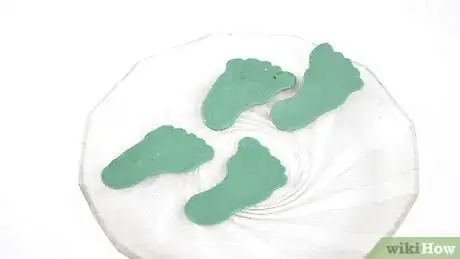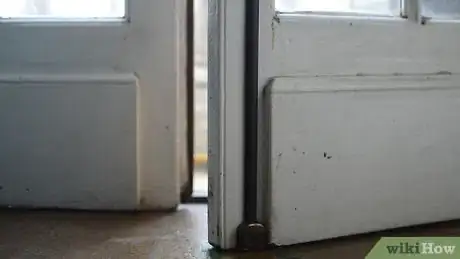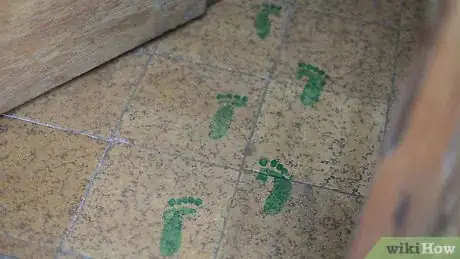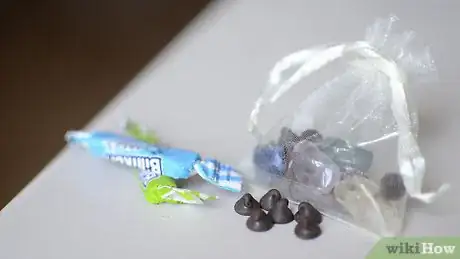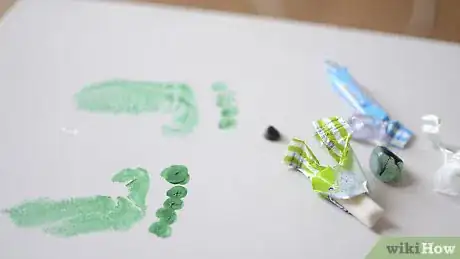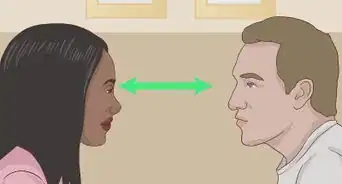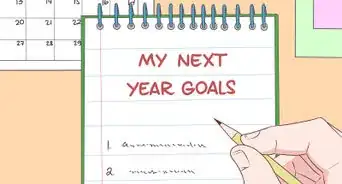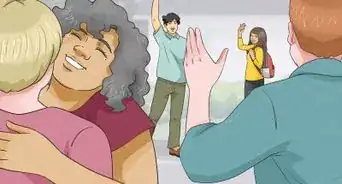This article was co-authored by wikiHow Staff. Our trained team of editors and researchers validate articles for accuracy and comprehensiveness. wikiHow's Content Management Team carefully monitors the work from our editorial staff to ensure that each article is backed by trusted research and meets our high quality standards.
The wikiHow Video Team also followed the article's instructions and verified that they work.
This article has been viewed 98,219 times.
Learn more...
Do you want to treat your child to a little leprechaun mischief this coming St. Patrick's Day? With a little bit of time and paint, you can stamp little leprechaun footprints all over your kitchen, bathroom, etc. If your child built a leprechaun trap the night before, you could even leave a treat there for your child to find. Don't feel like using paint? No problem, you can make edible ones too!
Steps
Creating Footprints
-
1
-
2Dip the bottom of your fist into the paint. Curl your hand into a fist. Dip it into the paint, then lift it away. You want to cover the entire edge of your palm and pinky. Keep your first tightly curled for the next step.[3]
- You can also apply the paint to your fist with a paintbrush.
- If you are using an ink pad, simply plunk your fist down onto it.
- Another option be to coat the bottom of a tiny shoe (ie: doll or baby) with paint.
Advertisement -
3Press your fist straight down onto the desired surface, then lift it up. You can make the prints on just about any surface. Hard, easily-washable surfaces, such as floors, counters, and windows, work the best. Do not wiggle or twist your fist while stamping, however.[4]
-
4Dip your pinkie finger into the paint. You can also use a paintbrush to apply the paint instead. You need just enough to cover the finger tip.
-
5Add five toes above the base print. Use your painted pinkie finger to stamp five small dots about the top, wide part of the print.[5] You can make them resemble a real footprint even more by making them get smaller and smaller, towards the side edge of the foot.
- Be mindful about the placement. The edge of your palm is the outer edge of the foot. That's where the pinkie toe goes!
- If you are using an ink pad, you will need to reapply the ink often.
-
6Repeat the process with your other hand. Make the next print a little bit above and to the side of the first print. Be mindful about the left and right placement. Remember: the edge of your palm will make the outer edge of the foot.
-
7Make more prints, if desired, then let the paint dry. Consider working your way backwards rather than forwards. This way, you won't risk accidentally smearing the paint as it dries.
- Most tempera and finger paints dry quickly. They should be ready within half an hour, at most.
Creating Shoeprints
-
1Squirt some washable, green paint into a small container. Tempera paint or finger paint will work the best for this. If you want to make the paint even easier to clean up, stir in a few drops of liquid dish soap before you apply the paint to your painting surface.
- If you will be making these on paper, consider using a green ink pad instead.[6]
-
2Find a small shoe to use. Doll shoes, Barbie shoes, and baby shoes would all work equally well. If you can't find one, you can carve a shoe shape into a cork. You can also by a rubber stamp shaped like a shoe print.
-
3Dip the shoes in the paint. Alternatively, you can apply the paint to the bottom of the shoe with a paintbrush. If you are using a rubber stamp, you could press it into an inkpad instead.
-
4Stamp the paint onto the your desired surface. Think about where your leprechaun went, then press the shoe onto that surface. It could be the floor, counter, or even a table.
- Do not wiggle or twist the shoe, or you may smudge the print.
-
5Repeat the process with the other shoe. Make the second print a little above and to the left or right (depending on the shoe) of the first one. Keep track of which shoe you are using. The left shoe needs to be on the left side of the track, and the right shoe needs to be on the right side.
-
6Make more prints, if desired. If the shoes are small enough, you could put them onto your fore and middle fingers, then "walk" your fingers. If the shoes are larger, however, consider working your way backwards rather than forwards. This way, you won't risk accidentally smearing the paint.
- Re-dip the shoes into the paint often, otherwise the footprints will start to fade.
-
7Allow the paint to dry. How long this takes depends on the type of paint you used. Most types of tempera and finger paints dry relatively quickly, however—about 30 minutes or so.
Making Edible Footprints
-
1Create your template. Find and print a set of small footprints or shoe prints; you can also draw them instead. Fill your paper with these prints, leaving space between each one. You will be using this template to trace your edible footprints, so use a size that appeals to you.
- Use a dark color, otherwise you won't be able to see the footprints through the parchment paper.
- You can pipe the footprints directly onto the plate instead. In this, click here to continue.[7]
-
2Cover the template with a sheet of parchment paper. Place the template onto a counter or baking sheet, then tape down the edges. Cover it with a sheet of parchment paper, then tape down the edges as well.
- If you will be using royal icing, you can use wax paper instead of parchment paper.
-
3Melt some green candy melts. Purchase a bag of green "candy melts" from the craft store. Place them into a microwave-safe bowl, then heat them at 30-second intervals in the microwave, stirring between each one. Keep doing this until they are smooth. Be sure to set the microwave to 50% power so that they don't burn.[8]
- If you can't find green candy melts, use white chocolate instead. Dye it green with candy coloring (not food coloring).
- You can also use royal icing instead. Prepare it from scratch or from a store-bought mix. Stir some green food coloring into it.[9]
-
4Transfer the melted candy into a piping bag. Place a piping bag into a tall glass first, then fold the top edge over the rim of the glass. Fill the bag with the melted candy/royal icing. Twist the bag shut, then snip off the tip.[10]
- You can also pour the melted candy/royal icing into a squeeze bottle instead.
-
5Outline the footprints first, then fill them in. If you used bare feet for the prints, you can use simple dots to make the toes. Make sure that they are connected to the main part of the foot, however, otherwise they will come apart when you peel the parchment paper away.
- For a fancier touch, add a sprinkle of green, edible glitter on top of the foot prints while the chocolate/icing is still well.
- Make extra footprints in case some break when you peel them off of the parchment paper.
-
6Allow the footprints to dry. How long this takes depends on how cold it is in your kitchen. Most candy melts will only take about 10 to 15 minutes. If you are using royal icing, this could take several hours to overnight.
-
7Peel the footprints off of the parchment paper. You may find it easier to cut the parchment paper into individual squares first, then peel it away from the footprints. Be very careful during this step so that the prints don't break.
-
8Arrange the footprints. Stagger the footprints so that they look like the leprechaun was walking. Place them on a plate or onto other edible (sweet) foods, such as: cakes, pies, or pancakes.
- Don't use the "candy melts" ones on warm food, otherwise they will melt.
- Consider leaving behind some evidence, such as a chocolate coin or a few Skittles.
- Get creative with your leprechaun's path. Have the leprechaun walk around foods he doesn't like and step onto the food he does like.
Getting Creative
-
1Think about how the leprechaun entered and left your house. Leprechauns can probably teleport, but it will look more realistic if the prints began and ended somewhere logical, such as a door. Here are some ideas to get you started:
- Front and/or back doors
- Cupboards or drawers
- Kitty or doggy doors
- Windows or vents
-
2Create a path. Leprechauns are curious and mischievous, so they wouldn't just run through a house without stopping. Think about what the leprechaun did in your house, then create a path based on that. Here are some things to think about:
- Did he get hungry? Maybe he stopped at the fridge or cookie jar.
- Did he take a potty break?
- Did he have troubles climbing up a steep surface? Maybe he slipped.
-
3Leave behind some evidence. When your child sees the prints, he or she will probably follow them to see where they lead. Leave a surprise or two along the leprechaun's trail to tell the story of what he did. Here are some ideas:
- A hungry leprechaun might take a small bite out of your child's breakfast.
- A messy and hungry leprechaun may leave a trail of the cereal he was munching on.
- A mischievous leprechaun would leave some prints on the fridge. He might even tint the milk green with food coloring.
- A naughty leprechaun would leave prints all over the toilet seat and tint the water green with food coloring. He might even leave the lid up!
-
4Leave a treat at the end! Don't leave your child disappointed by having the prints end at the door with nothing to remember him by. If your child built a leprechaun trap, consider ending the tracks there, and leaving a small gift for the child to find. Here are some ideas to get you started:
- For a nice leprechaun, leave a pile of gold coins (preferably chocolate) at the end of the trail.
- A creative leprechaun might leave money folded into an interesting shape, such as a ring or airplane.
- A forgetful leprechaun might leave behind a plastic pot of gold coins, Lucky Charms, or Skittles.
Things You'll Need
Creating Footprints
- Washable green paint
- Small dish
- Paintbrush (optional)
Creating Shoeprints
- Washable green paint
- Small dish
- Paintbrush (optional)
- Small shoe or shoe-shaped stamp
Making Edible Footprints
- Footprint template
- Parchment paper
- Tape
- Green candy melts
- Microwave-safe bowl
- Piping bag
- Scissors
References
- ↑ https://www.youtube.com/watch?v=DV1_NxnDW4Q
- ↑ https://www.somewhatsimple.com/leprechaun-footprints-scavenger-hunt/
- ↑ https://alphamom.com/family-fun/holidays/little-green-leprechaun-footprints/
- ↑ https://alphamom.com/family-fun/holidays/little-green-leprechaun-footprints/
- ↑ https://www.youtube.com/watch?v=DV1_NxnDW4Q
- ↑ https://www.somewhatsimple.com/leprechaun-footprints-scavenger-hunt/
- ↑ http://www.gourmetmomonthego.com/2009/03/leprechaun-lunch.html
- ↑ http://www.mybakingaddiction.com/how-to-make-heart-accents-for-cupcakes/
- ↑ https://www.youtube.com/watch?v=RGuK4y2WWg4
About This Article
To make leprechaun footprints, pour green tempera or finger paint into a dish. Next, curl your hand into a fist and dip the bottom of your fist into the paint so that the entire edge of your palm and your pinky is covered. Then, keeping your fist tightly curled, press it onto the desired surface and lift it straight up. Finally, dip your pinkie finger into the paint and add 5 small dots around the fist print to represent the toes. You can repeat this process to make as many footprints as you want! For tips on making leprechaun shoe prints, read on!
